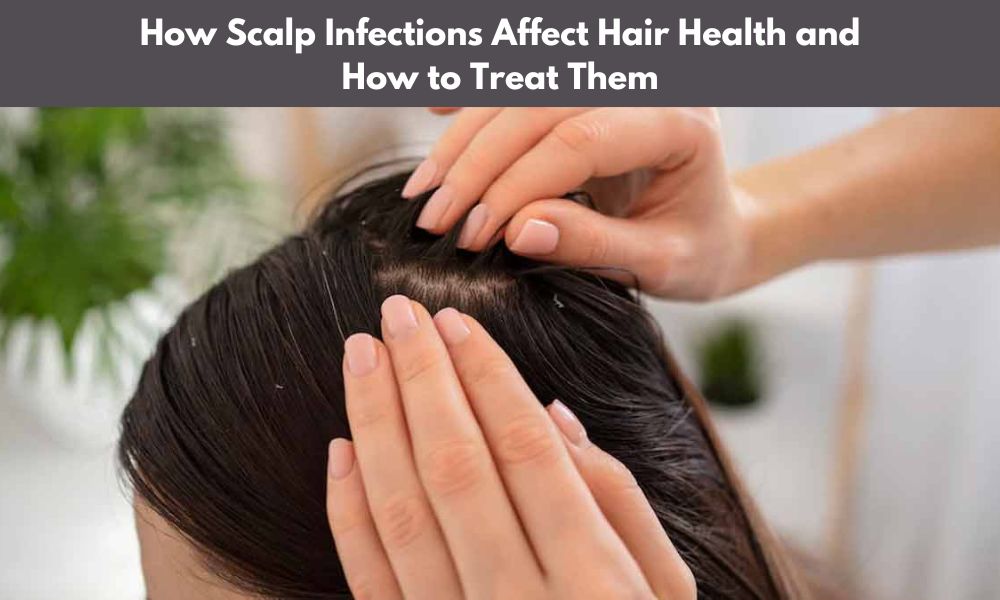The health of your scalp plays a pivotal role in determining the vitality of your hair. Unfortunately, scalp infections can severely disrupt this balance, leading to various hair problems such as thinning, breakage, or even permanent hair loss. This blog delves deeper into the causes of scalp infections, their effects on hair health, and the most effective treatments to restore both scalp and hair vitality.
Understanding Scalp Infections
Scalp infections arise due to bacteria, fungi, viruses, or other microorganisms that attack the scalp’s skin and follicles. These infections can result from poor hygiene, overactive sebaceous glands, weakened immunity, or underlying skin conditions.
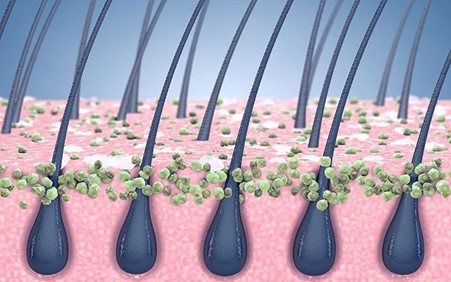
1. Fungal Infections
Fungal infections, particularly ringworms of the scalp, are caused by dermatophyte fungi. These infections thrive in warm, humid environments and are highly contagious, often spreading through direct contact or contaminated objects like combs or towels. They usually manifest as circular bald patches with red, itchy, and scaly skin. If left untreated, they can cause significant inflammation and scarring, leading to permanent hair loss.
2. Folliculitis
Folliculitis occurs when bacteria, such as Staphylococcus aureus, infect hair follicles. It begins as small, red bumps that may become pus-filled over time. This condition can result from shaving, tight hairstyles, or excessive use of oil-based products that clog pores. In severe cases, folliculitis can lead to painful abscesses or scarring, which permanently damages hair follicles and hampers hair regrowth.
3. Seborrheic Dermatitis
Seborrheic dermatitis is a chronic inflammatory condition linked to the overgrowth of yeast on the scalp. It appears as yellowish, greasy scales or flakes, often accompanied by redness and persistent itching. Factors like stress, hormonal fluctuations, or cold weather can trigger or worsen the condition. While it’s not contagious, scratching the affected area can lead to secondary bacterial infections, further damaging the scalp and hair.
4. Scalp Psoriasis
Although scalp psoriasis is not an infection, its symptoms often overlap with fungal conditions. This autoimmune disorder leads to the formation of thick, silvery scales on red patches of skin. The plaques can be itchy and painful, and excessive scratching may cause bleeding. Psoriasis disrupts the natural growth cycle of hair, weakening follicles and contributing to temporary or permanent hair loss.
5. Impetigo
Impetigo is a bacterial infection characterized by red sores that burst and form a yellowish crust. Common in children but also affecting adults, impetigo spreads rapidly through contact. On the scalp, it can cause discomfort and inflammation and disrupt hair growth. Early treatment is crucial to prevent the infection from spreading to other areas or causing deeper skin damage.
Impact of Scalp Infections on Hair Health
Scalp infections can significantly affect the quality and quantity of your hair. Let’s break down the most common effects:
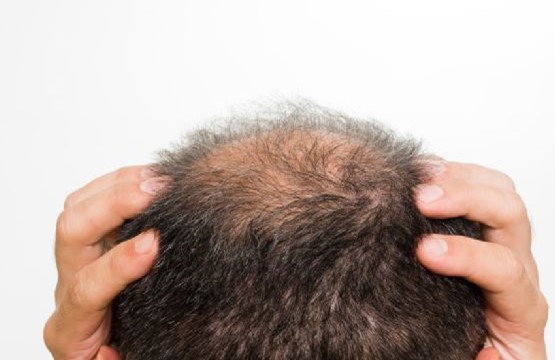
1. Hair Thinning and Loss
Scalp infections can inflame the hair follicles, disrupting their function. Over time, this inflammation weakens the follicle’s ability to anchor hair, leading to shedding. In severe or prolonged cases, the damage can scar the follicle, resulting in permanent hair loss, known as scarring alopecia.
2. Weakened Hair Shaft
An unhealthy scalp environment weakens the hair shaft, making it more susceptible to breakage. This happens because infections disrupt the natural balance of oils and nutrients, depriving the hair of the strength it needs to grow healthily.
3. Poor Hair Growth
Chronic infections can compromise the scalp’s ability to produce new hair. Infections cause inflammation that disrupts the growth cycle, leading to slow or stunted hair regrowth.
4. Scalp Irritation
Persistent itching, burning, or tenderness from infections can cause physical discomfort and psychological stress. Scratching exacerbates the issue, damaging the scalp further and creating an environment for secondary infections.
5. Emotional and Psychological Impact
Hair loss or visible scalp conditions can significantly affect self-esteem and confidence. Many individuals with severe scalp infections experience anxiety or depression, highlighting the importance of timely treatment.
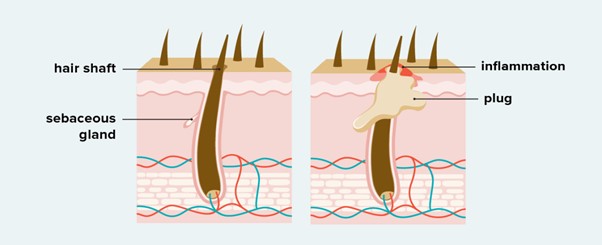
How to Treat Scalp Infections
Treating scalp infections involves a combination of medical intervention, proper scalp care, and lifestyle adjustments. Below are some effective approaches:
1. Medical Treatments
For bacterial infections like folliculitis or impetigo, oral or topical antibiotics are often prescribed. For fungal infections like tinea capitis, doctors recommend oral antifungals such as terbinafine or griseofulvin. Medicated shampoos containing ketoconazole, selenium sulfide, or zinc pyrithione are effective for fungal and yeast infections. Steroid creams or injections can reduce inflammation in conditions like seborrheic dermatitis or psoriasis.
Over-the-Counter Shampoos and Solutions Medicated shampoos with salicylic acid or coal tar are highly effective for mild cases. These ingredients help reduce flakes, itchiness, and inflammation, promoting a healthier scalp environment.
- Antifungal Medications
Oral antifungals like Griseofulvin or Terbinafine are prescribed for fungal infections such as ringworm of the scalp. These medications target the root cause of the infection, preventing its spread and aiding in the recovery of hair follicles. They are usually taken for 4-8 weeks.
- Topical Antibiotics
For bacterial infections like impetigo or folliculitis, topical antibiotics such as Mupirocin are effective. These creams or ointments kill bacteria at the site of infection, reduce inflammation, and prevent further complications like abscess formation.
- Medicated Shampoos
Shampoos containing Ketoconazole, Selenium Sulfide, or Zinc Pyrithione help manage fungal infections and seborrheic dermatitis. They work by reducing microbial growth and soothing inflammation. Regular use can control symptoms and restore scalp health.
- Corticosteroid Treatments
Topical corticosteroids like Betamethasone creams or scalp lotions reduce severe itching and inflammation caused by conditions like psoriasis or seborrheic dermatitis. In more severe cases, injectable steroids may be used to provide faster relief and control symptoms.
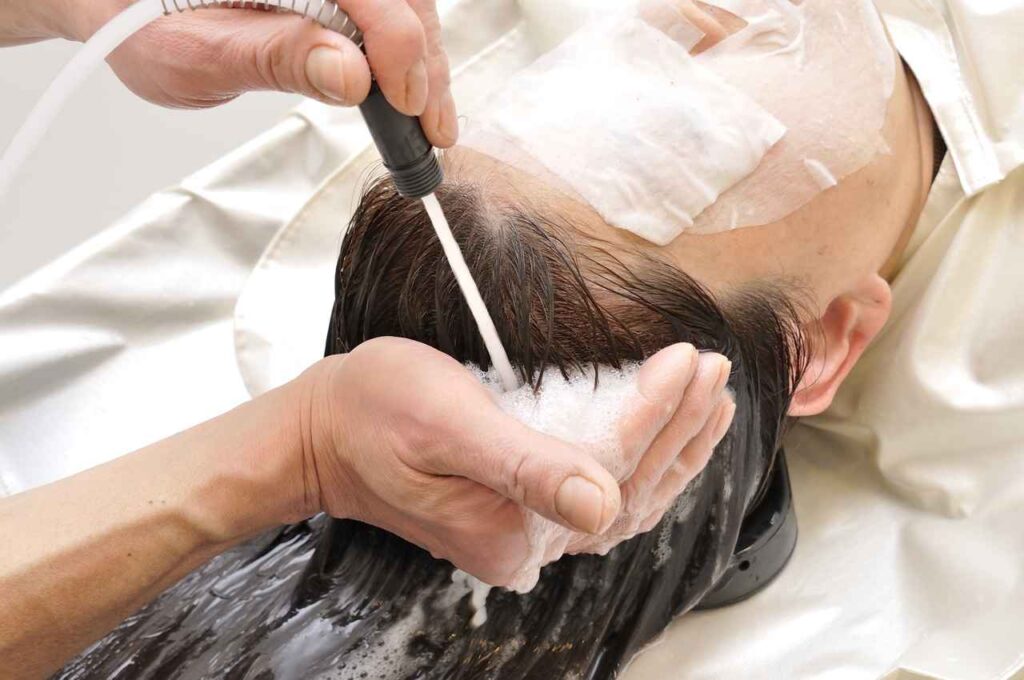
2. Home Remedies
Natural remedies like tea tree oil (antifungal and antibacterial), apple cider vinegar (pH-balancing), and aloe vera (soothing and anti-inflammatory) can complement medical treatments. For example, a diluted tea tree oil solution can be applied directly to the scalp to alleviate symptoms.
3. Maintain Scalp Hygiene
Washing hair regularly with a gentle shampoo can prevent the accumulation of dirt, oil, and sweat that create a breeding ground for microorganisms. Avoid sharing personal items like combs or towels to minimize the risk of spreading infections.
4. Dietary Adjustments
A diet rich in essential nutrients, including zinc, biotin, iron, and omega-3 fatty acids, supports scalp and hair health. Foods like nuts, fish, eggs, and leafy greens strengthen hair and boost overall scalp condition.
Preventing Scalp Infections
Preventing scalp infections is as important as treating them. Keep your scalp clean and dry, especially after sweating or swimming. Use sulfate-free shampoos to avoid irritation and treat dandruff at the earliest signs. Avoid tight hairstyles that pull on the hair and scalp, as they can weaken follicles over time. Regular scalp massages can improve circulation, reducing the likelihood of infections.
When to Seek Professional Help
While mild scalp infections may improve with over-the-counter solutions, seek professional attention if symptoms persist or worsen. Sudden hair loss, painful sores, or signs of secondary infections like pus or bleeding require immediate medical evaluation to prevent long-term damage.
Conclusion:
Scalp infections can severely impact your hair health and overall confidence. By understanding the types, causes, and symptoms, you can take proactive steps to address them. Whether through medical treatment, home remedies, or lifestyle adjustments, restoring scalp health is achievable. Remember, a healthy scalp is the foundation for strong and beautiful hair!
Skin Town Clinic is a trusted destination for comprehensive dermatological care. Whether you’re dealing with stubborn scalp conditions or seeking effective Scalp Treatment in Mumbai, our experienced professionals are here to guide you toward healthier hair and scalp.
Special thanks to Kailash Arage for helping us with the blog.

